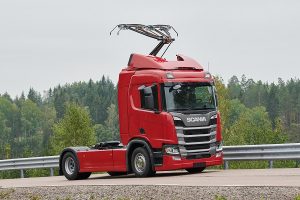Diesel trucks to reach the end of the road by 2040
Europe’s truck makers have agreed to phase out the use of fossil fuels in new vehicles by 2040, with the objective of achieving carbon neutrality in road freight transport by 2050.
ACEA, the European manufacturers’ trade body, has warned that this will only be possible if a robust charging and fuelling infrastructure is created, and a coherent policy framework is put in place.
Chief executives at Europe’s truck manufacturers – DAF, Daimler, Ford, Iveco, MAN, Scania and Volvo Group – worked together with the Potsdam Institute for Climate Impact Research (PIK) to produce the roadmap to carbon neutrality.
Henrik Henriksson, chair of ACEA’s Commercial Vehicle Board and CEO of Scania, said: “Climate change is the most fundamental challenge of our generation. At the same time, the raging Covid-19 pandemic has put the spotlight on the crucial role that road transport and logistics play to ensure that food, medicines and other essential goods are available to those who need them.
“If road freight transport is to maintain its role in serving society, we need to move away from fossil fuels as quickly as possible. Not only are we convinced that it is necessary, we know it is possible and we are ready to make it happen. But we cannot do it alone; we need policymakers and other stakeholders to join forces with us.”
In addition to investment by the commercial vehicle sector, the effort would require shifts in policy such as an “energy taxation system based on carbon and energy content”, ACEA said, and CO2 emissionsbased road charges.
The body also said that the rapid rollout of a “dense network of charging and refuelling infrastructure suitable for trucks” would be crucial in facilitating the shift to low and zero-emission heavy-duty vehicles. One of the most effective instruments for change, ACEA and PIK suggested, would be “a sound CO2 emissions pricing system”, as it warned that takeup of zero-emission vehicles would be limited while diesel remained cheaper.
It should be noted that the phase-out of fossil fuels does not mean the phase-out of internal combustion engines. Truck manufacturers are working on a broad range of solutions ranging from using alternative fuels in existing engines to all-electric powertrains using batteries, external mains supply and hydrogen fuel cells.
ACEA said that new powertrain technologies would: “fast become the backbone of road freight transport across all ranges and the majority of vehicle segments. Reliable and efficient batteryelectric trucks are already available and will be followed by hydrogen-powered trucks. The range of zero-emission vehicle offerings will increase rapidly over the next few years.”
But on fuel and infrastructure, it warned: “The availability of clean electricity, clean hydrogen and low- or zero-carbon fuels, such as advanced, renewable biofuels, will be crucial for the transition towards a carbonneutral transport sector…
“The commitment of all stakeholders and policy makers on European and member state level must match the ambition set for the vehicle industry. This will require swift coordinated action and massive investments, supported by public funding. Truck manufacturers stand ready to support the infrastructure rollout by collaborating with public and private stakeholders.”
ACEA added: “An ambitious carbon price, which gradually increases to significantly higher levels than today, is crucial to drive the deployment of zero-emission technologies and adequately incorporate the total costs of CO2 emissions.”
It warns against the dangers of greenwashing: using nonrenewable sources to meet demand for energy for ‘carbon neutral’ vehicles, for instance, by ramping up coal-burning power stations to meet increased demand for electricity.
“All energy carriers, such as electricity, hydrogen and low-carbon fuels, must be decarbonised rapidly. Therefore, policy makers need to take full account of the wider perspective and also address the whole value chain, including the energy carriers.
“The transformation of the sector will be unprecedented in speed and scale. All stakeholders and partners in transport and logistics are invited to join this process, and to live up to the ambition required to bend the emissions curve now in the most sustainable way for society,” the ACEA statement concluded.












